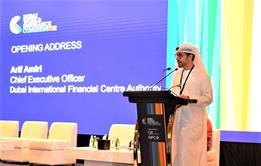Insurers and brokers who undercut the environmental, social, and corporate governance standards (ESG) will face ‘catastrophic’ consequences, a roundtable on the topic heard.
The packed room at the Dubai World Insurance Congress roundtable heard concerns that insurers and brokers could undercut standards to make more money for themselves by investing, underwriting or broking in areas which fall short of ESG standards.
Another concern was that companies see ESG as a ‘box ticking’ exercise, with no auditing process.
A roundtable panellist, speaking at the event, called ‘ESG: Rising to the challenge - Middle East potential’, said: “Who is there to evaluate what is being accomplished? That is a concern to me because many of these companies are publicly listed companies. There is potential for false information, false disclosures. They can have significant liabilities with implications from a D&O perspective.”
One roundtable panellist, with experience in the Lloyd’s market, warned of the consequences of firms trying to undercut ESG: “We (Lloyd’s) do not want to become the market of last resort. We started off by saying that we would cease writing new coal, tar sands, artic explorations. That was the initial statement. It created a lot of stir in the market.
“If any of the underwriters operating in the Lloyd’s market choose to go down the route of becoming a market of last resort, they will be dealing with the reputational fallout of that decision.
“If you put your head in the sand and say everyone else is running away from coal, now there is an opportunity, there might be in the short-term.
“But the long-term damage to your business of making a decision like that would be catastrophic.”
The room heard an encouraging message from one roundtable member, who stressed ESG was being taken seriously.
“Most of the big energy players in the region are making huge investment in things like solar, wind and hydrogen. There is no doubt about that now,” he said.
“A lot of the regional players are very keen to work with major insurers, brokers, people like Lloyd’s, to benchmark what they are doing.
“So yes, they are absolutely some people who saying ‘I’ll fill in a form in and that will be fine’.
“I could not agree more about the exposures they are building up unwittingly. But the majority of people I have spoken to at Lloyd’s are very serious about this.”
Defining ESG
Another issue with ESG was that there is no universal definition of ESG, the roundtable agreed.
There was a lively debate around defining ESG, but nobody came out with a strict definition.
One member summarised: “ESG’s ultimate goal, effectively, is to raise the cost of capital for companies to make sure that we do not engage, insure or invest in bad industries, bad behaviour.”
Another member said he felt strongly that you must stand for something with ESG. Customer benefit would follow.
‘I do not want to be part of the pollution industry’ - that is a good thing to stand for, and I think most companies and shareholders will ultimately understand that you are standing for something.
“I believe that as the population of people consuming insurance is getting younger and getting more educated, and more aware that they have a responsibility, they are actually going to start to saying, ‘you know what, I’m going to go with this company because it is cleaner, it stands for something’. ”
The future of ESG
The future would see more convergence on definitive standards for ESG.
One area of ESG that already had a clear definition was the Task Force on Climate-related Financial Disclosure (TCFD).
TCFD was developed by an international body, the Financial Stability Board, in 2015. It has created a common standard on what companies should disclose their shareholders, customers, and staff on climate issues.
One panellist said: ” What we are seeing - driven by governments - what we are seeing is greater adoption of these standards, TCFD being the main one.
“One of the key disclosures is carbon intensity, mainly of your investment portfolio right now and it will also be on the underwriting portfolio.
“There are scientific tools being developed to be able to measure that, which will ultimately become widespread.
“Whether it is mandatory on a government level or just expected on a government level, there will also be tools that are more credible to measure that.
“This will lead to a lot more transparency into who sits where on the spectrum and that will drive a lot more convergence than what we are seeing now.”
DWIC 2022: 800 delegates flock to conference

Arif Amiri, CEO of the DIFC Authority, officially launched the fifth Dubai World Insurance Congress 2022
- 1
 Currently
reading
Currently
reading
DWIC2022: ESG: Rising to the challenge - Middle East potential
- 3
- 4
- 5
- 6
- 7
- 8
- 9


























No comments yet